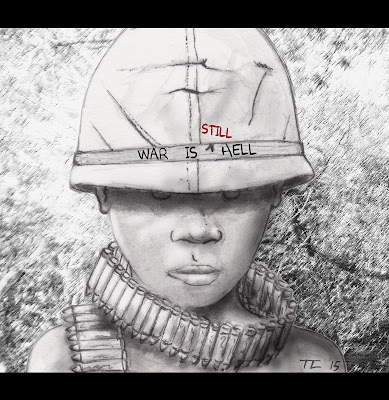War is hell. No surprise there. Add children and matters just get worse. Three sentences in and already I worry that I'm sounding flippant... It's hard to write about something that's terrible and true and is somehow not in our distant past. Cary Fukanaga (the writer/director) faces the same trouble whilst putting it on screen.
Beasts of No Nation is set in an unnamed African country and follows a young boy, Agu (Abraham Attah), as he goes from a happy, if impoverished, life with his family, to a dead-eyed follower of Commandant (Idris Elba), the leader of a growing rebel group prone to guerilla warfare. The steps that take him from his family life to his rebel life are much as you'd expect: death, manipulation, death, a spot of black magic, drugs, and more death.
This isn't the first film to touch upon child soldiers, or soldiers so young that they might as well be children (the brutalising Come and See is particularly worthwhile, so long as you don't mind being flung into an emotional pit of despair for almost 3 hours), but Beasts of No Nation is the first to properly tackle the story of child soldiers in Africa - at least outside of documentaries. There's much to like, if 'like' is the right word when dealing with a film whose subject matter couldn't be bleaker: Fukunaga's cinematography is stunning; Dan Romer's score is highly evocative, and Attah's performance as Agu is preternaturally good. But, oddly, the film has little emotional impact. It'd make sense if the initial horrors hit home, whilst the subsequent ones became less brutalising due to the constant onslaught of death and depravity, making our journey through the film mirror that of Agu's. Unfortunately, that's not what happens. (At least not to me. Which suggests either a misstep on the filmmaker's part or means I'm dead inside... ) Instead, to appreciate the gravity of the situation, I found I had to step out of the film and tell myself 'This is something that happens', at which point the impact of what was happening finally landed - but not before.
Further compounding the problem is Elba's Commandant. As charismatic as Elba is - and he's very charismatic - he's simply too likeable. When he does terrible things it's hard to equate them with Elba, as he remains amiable, if occasionally irascible, throughout. At times, it felt like his TV character Luther had taken a wayward path in recent years (his wandering accent rather accentuated the impression). When things don't quite work out for him you don't think 'Aha! Karma has come for thee Commandant!' Instead you think 'Gee, that's a shame. I hope things start to look up for poor Elba'.
All told Fukunaga's film is still impressive, even if it's impact is more cerebral than emotional.
Visceral impact: 6/10
Impact-once-the-gravity-of-the-situation-hits-home-after-some-musing: 8/10
Overall: a conflicted 7/10

No comments:
Post a Comment